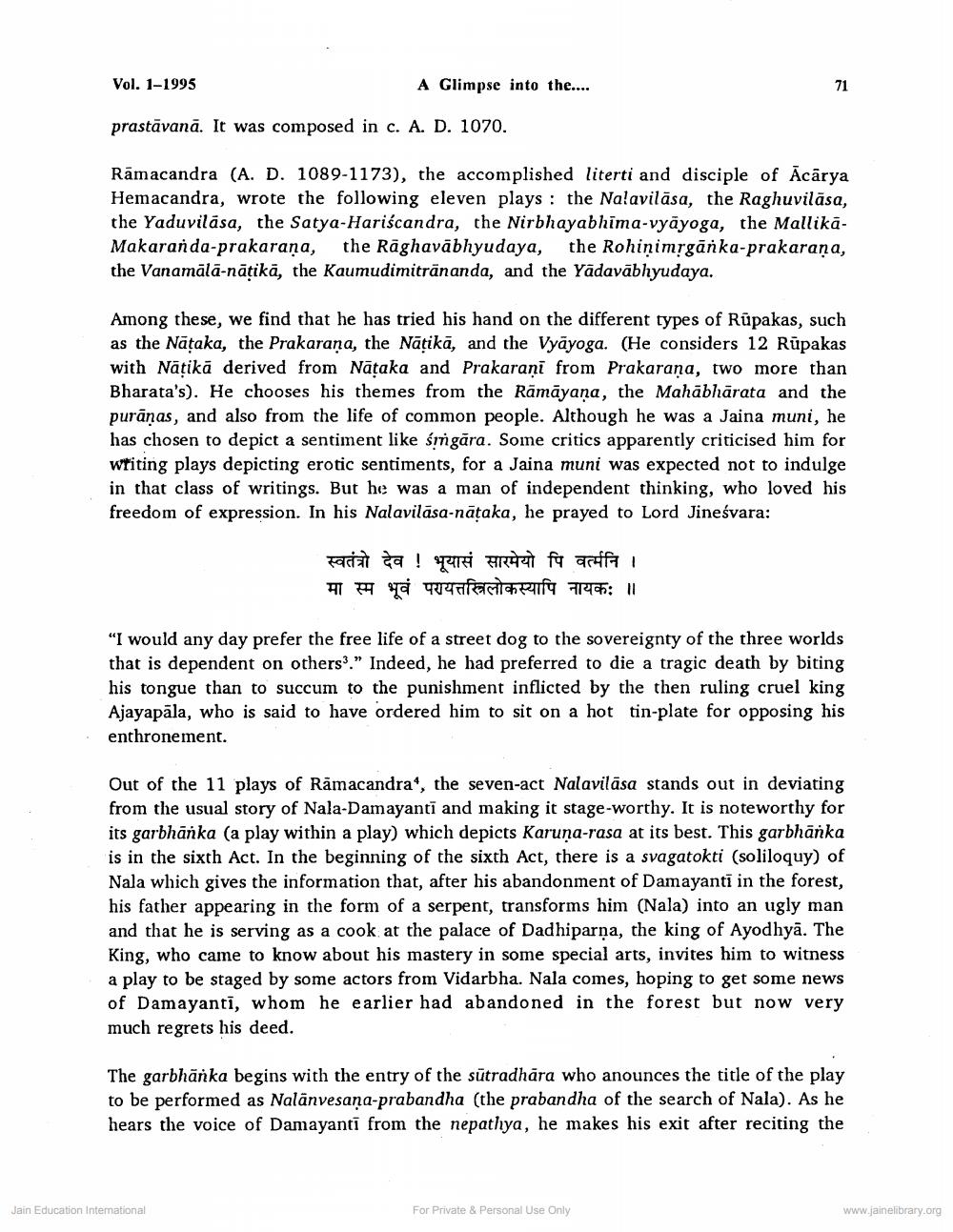________________
Vol. 1-1995
A Glimpse into the....
prastāvanā. It was composed in c. A. D. 1070.
Rāmacandra (A. D. 1089-1173), the accomplished literti and disciple of Ācārya Hemacandra, wrote the following eleven plays: the Nalavilāsa, the Raghuvilāsa, the Yaduvilāsa, the Satya-Hariscandra, the Nirbhayabhima-vyāyoga, the MallikaMakaranda-prakarana, the Rāghavābhyudaya, the Rohiņimrgānka-prakarana, the Vanamālā-nātikā, the Kaumudimitrānanda, and the Yadavābhyudaya.
Among these, we find that he has tried his hand on the different types of Rūpakas, such as the Nataka, the Prakarana, the Nātikā, and the Vyāyoga. (He considers 12 Rūpakas with Nātikā derived from Nataka and Prakaraṇi from Prakarana, two more than Bharata's). He chooses his themes from the Rāmāyaṇa, the Mahābhārata and the purānas, and also from the life of common people. Although he was a Jaina muni, he has chosen to depict a sentiment like singāra. Some critics apparently criticised him for witing plays depicting erotic sentiments, for a Jaina muni was expected not to indulge in that class of writings. But he was a man of independent thinking, who loved his freedom of expression. In his Nalavilāsa-nataka, he prayed to Lord Jineśvara:
स्वतंत्रो देव ! भूयासं सारमेयो पि वर्त्मनि । मा स्म भूवं परायत्तस्त्रिलोकस्यापि नायकः ॥
"I would any day prefer the free life of a street dog to the sovereignty of the three worlds that is dependent on others." Indeed, he had preferred to die a tragic death by biting his tongue than to succum to the punishment inflicted by the then ruling cruel king Ajayapāla, who is said to have ordered him to sit on a hot tin-plate for opposing his enthronement.
Out of the 11 plays of Rāmacandra', the seven-act Nalavilāsa stands out in deviating from the usual story of Nala-Damayanti and making it stage-worthy. It is noteworthy for its garbhānka (a play within a play) which depicts Karuņa-rasa at its best. This garbhānka is in the sixth Act. In the beginning of the sixth Act, there is a svagatokti (soliloquy) of Nala which gives the information that, after his abandonment of Damayantī in the forest, his father appearing in the form of a serpent, transforms him (Nala) into an ugly man and that he is serving as a cook at the palace of Dadhiparna, the king of Ayodhyā. The King, who came to know about his mastery in some special arts, invites him to witness a play to be staged by some actors from Vidarbha. Nala comes, hoping to get some news of Damayanti, whom he earlier had abandoned in the forest but now very much regrets his deed.
The garbhānka begins with the entry of the sūtradhāra who anounces the title of the play to be performed as Nalānvesana-prabandha (the prabandha of the search of Nala). As he hears the voice of Damayanti from the nepathya, he makes his exit after reciting the
Jain Education Intemational
For Private & Personal Use Only
www.jainelibrary.org




